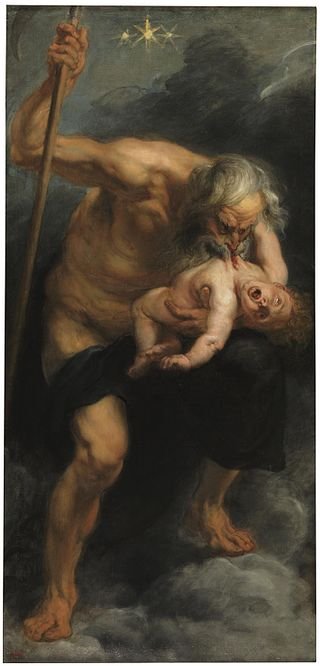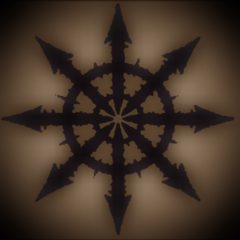Jung understood the rise of Nazism in terms of the emergence of an archetype: the god Wotan (Jung 1970).
At a seminar where this was discussed a skeptical participant enquired, “If Wotan was responsible then where was he?â€
“He was simply in the air at that time, in the landscape, the rivers, the trees,†another participant answered.
“But the trees and rivers didn’t join the Nazi party,†the skeptic rejoined.
The skeptic’s error is to suppose that archetypes provide a causal explanation. Of course, they do not. But they may illuminate the reasons for events, because whereas causes reside in material reality, reasons lie within the reality of human understanding.
What can offer a more convenient means for apprehending huge-scale shifts in behaviours and attitudes than the notion of a god? So in this sense, I propose, we are in the grip of an archetype at least as strong and malevolent as Wotan. Presently we are governed by the acolytes and ideology of Cronos, that baleful deity who passes also by the name Saturn, and his associated images of Old Father Time and the Grim Reaper.
Cronos was the son of the first god, Uranus, himself the son of Chaos and Mother Earth. The first distinctive act of Cronos was to depose his father by castrating him. Yet after assuming power it was prophesied that Cronos would also be deposed by his son. To maintain his position, Cronos ate his children as soon as they were born. The tactic served him well until the birth of Zeus, for whom a stone was substituted that Cronos unwittingly ate instead. Zeus was raised in secret and, when fully grown, administered a potion to Cronos that made him vomit up all the brothers and sisters he had swallowed.
Perhaps there is a specific prophecy in the version of the myth penned by Robert Graves, wherein Cronos and his supporters are “banished to a British island in the farthest west†(Graves 1992: 40). The enduring presence of Cronos in this part of the world might account (non-causally) for why we live in times of such acute anxiety regarding those who prey upon children.
Prominent politicians and figures in the entertainment industry have been exposed as prolific abusers of children. We are tormented by a suspicion that this abuse could be endemic, perhaps institutionalised within the highest strata of our society. Yet the serial resignations of the Chairs of the Independent Enquiry into Child Sexual Abuse (2016), the non-government enquiry set up to investigate these claims, suggests also a curious powerlessness to expose the truth.

The distinguishing trait of Cronos is his grip on the present by retarding and denying both life and power to whatever might dare to succeed him. We see this attitude also in corporations that cling to profits even whilst cognizant of the harm they do, and even when in possession of means to act more benevolently. The manufacturers of excessively sugary foods are acolytes of Cronos. So too, the fracking industry, which clings to fossil-fuels, denying the ascendancy of renewable energy sources.
There is justification for conservation of the current good. Sustaining the present can provide stability and peace. But Cronos personifies how this slips into tyranny when the ruling order perpetuates itself purely on the basis that that is what it is. No longer is this conservation, but instead the prevention of the future from being born.
The gods interact with but transcend the psychological realm. The machinations of Cronos are visible in the economy, politics and culture. Yet Cronos is what he is, and is not any of the manifestations of himself. We cannot ask why Cronos is this way, because in the nature of a god is no gap, unlike the gap that intervenes in human experience between our consciousness and nature.
Cronos simply is, but for a human being to become his acolyte requires an alienation from nature, one that supplants the protection and honouring of our future and offspring with a desire to despoil, exploit and limit. Cronos is pervasive because he slips easily into the consensus. We assume there must be good reasons for things being the way they are. The way things are is what feels normal. But what if the reasons for normality are really not good ones at all? If only a few reap the full benefit from things the way they are, can that be a good reason? If not, then what is normal is irrational and sick. The myth of Cronos is the violence and madness that can come to underpin the semblance of normality.
The psychoanalyst Christopher Bollas was the first to identify what he called ‘normotic’ illness, which “is typified by the numbing and eventual erasure of subjectivity in favour of a self that is conceived as a material object among other man-made products in the object world†(Bollas 1987: 135). Such a person is “someone who is abnormally normal. He is too stable, secure, comfortable and socially extrovert. He is fundamentally disinterested in subjective life†(136). The normotic personality “is alive in a world of meaningless plenty†(137).
The normotic is an acolyte of Cronos because his flight from nature, from his soul, is underpinned by the dominant discourse, materialism, which avers that we are exclusively physical organisms, separately adrift in a meaningless universe. This is considered a normal way of looking at life. But no one could give this idea credence, and it would not have required the acumen of Bollas to sniff out the normotic’s pathology, were it not for the fact that so many already believe in and shore up this view.

The creation of a normotic individual entails a type of abuse that hides its perversion behind a guise of normality. The normotic parent creates a normotic child by taking Cronos as a role model and consuming the child’s soul before that soul can be born. Bollas remarks how: “It is indeed striking how this [normotic] person seems to be unborn. It is as if the final stages of psychological birth were not achieved and one is left with a deficiency [… in] that originating subjectivity which informs our use of the symbolic†(140-1). Without either soul or the capacity to use symbols, the normotic becomes the antithesis of a practitioner of magick.
Sermons to the Unborn was a title that sprang fully-formed from the mind of Bonhomme. At the time it sounded right, but I feel I am only now beginning to understand why. Our sermons on this blog are addressed to the unborn, the acolytes of Cronos. And our impossible mission is to preach to those least equipped to hear.
References
Bollas, C. (1987). The Shadow of the Object: Psychoanalysis of the Unthought Known. London: Free Association Books.
Elliott, L. “Millennials may be first to earn less than previous generation – studyâ€. theguardian.com (accessed August 26, 2016).
Graves, R. (1992). The Greek Myths. Harmondsworth: Penguin
Independent Enquiry into Child Sexual Abuse. “Professor Alexis Jay OBE becomes Chair of the Inquiry.†iicsa.org.uk (accessed August 26, 2016).
Jung, C.G. (1970). Wotan. In: Collected Works of C.G. Jung, vol. 10, 179-193. Princeton: Princeton University Press.
Frater U∴D∴ (2005). High Magic: Theory and Practice. St. Paul, MN: Llewellyn.
